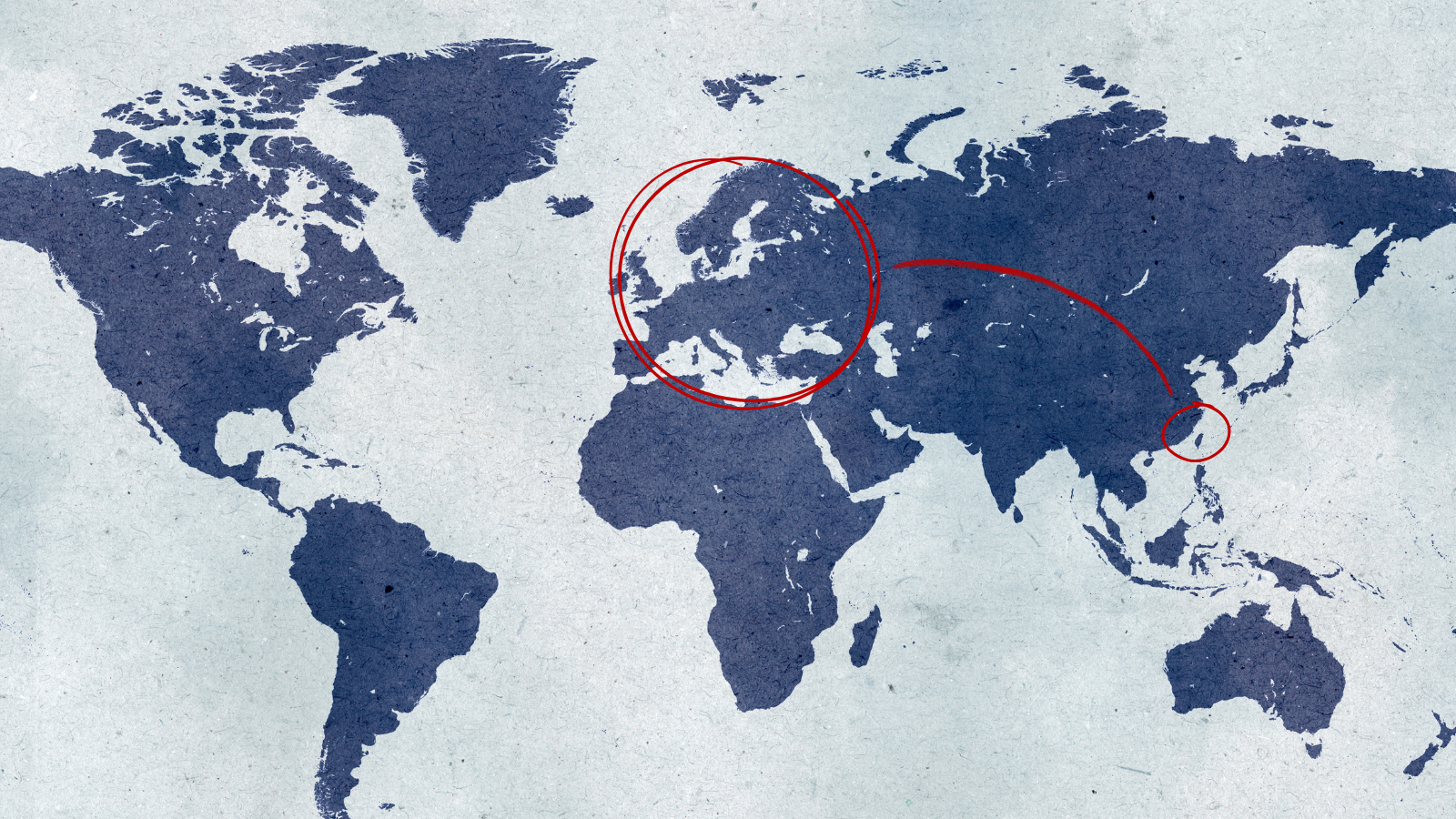Taiwan enjoys formal diplomatic relations with only a handful of countries, a result of China imposing its one-China policy on its bilateral relations. Taiwan’s diplomatic allies are all small and relatively weak countries; the Holy See (Vatican) is its only official diplomatic ally in Europe. However, this does not mean that Taiwan’s foreign policy is without resources; when formal relationships are not possible, ‘informal’ or ‘substantive’ ties serve as an excellent substitute. And, indeed, Taiwan’s engagement with Europe is thriving. Much of the heavy lifting in this arena is done by representative offices which function as embassies, although most are registered in the hosting country as international organizations and/or associations. CEIAS looked closer at the current state of these de-facto embassies.
Over the past few years, EU-Taiwan relations grew stronger in all aspects, with interactions between the two sides growing six-fold between 2019 and 2023 (see Figure 1). In 2019, only 23 interactions were recorded across the entire EU – these were governmental, parliamentary, military, economic, and cultural engagements, as well as mutual visits. Despite recovering from the pandemic, these increased eight-fold in 2022 to 184 recorded interactions. In 2023, with the year still not over, there were 138 interactions (for more details, see the EU-Taiwan Tracker). What brought about this change?
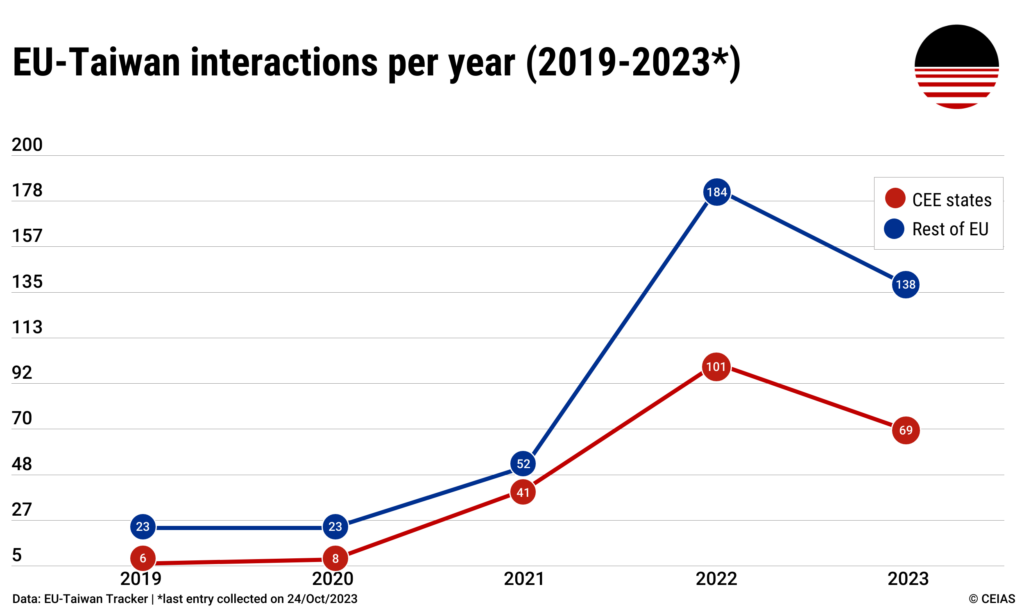
A significant change to EU-Taiwan relations came with the adoption of the EU-China Strategic Outlook in 2019 and the reaffirmation of the European Commission’s commitment to enhance EU-Taiwan relations and buttress the shared values outlined earlier in the Commission’s 2016 EU Strategy on China. In April 2021, the Commission launched its Indo-Pacific strategy to intensify close cooperation with like-minded partners in various areas. A few months later, the European Parliament adopted its first resolution on the EU-Taiwan political relations and cooperation, explicitly urging the European External Action Service (the EU’s de-facto foreign ministry), EU member states, and the Commission to strengthen their political partnerships with the island state. Moreover, the European Parliament has repeatedly expressed its condemnation of China’s coercive foreign policy in the Taiwan Strait and vocally supported Taiwan’s courage against external threats, as well as Taipei’s efforts to participate more actively in UN bodies.
While the general trend of enhanced relations between the EU and Taiwan may be the result of external factors, such as the EU’s desire to lessen its dependence on China, many of the concrete interactions between EU members and Taiwan (outlined above) are a direct result of work conducted by representative offices in respective countries. Often, they are registered as international organizations and associations. For instance, Taiwan’s representation in Slovakia is legally registered as an international organization and association (Medzinárodná organizácia a združenie); in Czechia as an association (Spolek); in Poland as a foreign representative office (Przedstawicielstwa zagraniczne); in Portugal as a cultural and recreational association (Associações culturais e recreativas); in Finland as a foreign organization (Utländskt samfund); and in France as a declared association (Association déclarée). These designations give Taiwan’s overseas offices the right to apply for and enjoy diplomatic benefits such as diplomatic license plates on vehicles, exemptions from taxes and tariffs, free movement of personnel, or diplomatic immunity.
Therefore, in the absence of official diplomatic ties, these offices assume the function of embassies and, besides typical consular activities (such as issuing visas), they also facilitate economic and cultural cooperation, science and technology exchange, and networking. Such offices are thus the most effective means of reaching the low-hanging fruit of bilateral relations between the EU and specific EU countries and Taiwan.
How vast is Taiwan’s presence in the EU and vice-versa?
Regarding the EU’s representation in Taiwan, 16 out of 27 EU member states and the EU as an individual entity have established representative offices in Taiwan. Taiwan has its representative offices in 19 out of 27 EU countries, while the Brussels office also serves as a mission to the EU.
The offices come under different names, such as the Taipei Representative Office in France, the Taipei Economic and Cultural Office in Austria, the Taipei Mission in Sweden, the Taipei Representative Office in Bratislava, and the Taipei Economic and Cultural Center in Portugal. These names emphasize the focus of their activities and, at the same time, keep the institutionalization of EU-Taiwan bilateral relations compliant with the provisions of the one-China policy. One stark deviation from this practice is Lithuania, which allowed Taiwan to open its mission in Vilnius in 2021 under the name “Taiwanese Representative Office in Lithuania”, using the name Taiwan rather than just Taipei. Coupled with Lithuania leaving the Beijing-led 17+1 initiative shortly beforehand, this angered Beijing, which responded with retaliatory measures.
On the other hand, almost every EU office in Taipei uses a different name. For example, there is the Austrian Office in Taipei, the Italian Economic, Trade, and Cultural Promotion Office in Taipei, and the Swedish Trade and Invest Council. As the names suggest, most of these missions are focused primarily on expanding economic and cultural ties. There is again one exception – the “European Trade and Cultural Office in Taiwan” which directly uses the island’s name. A comprehensive overview of these de-facto embassies can be assessed below.
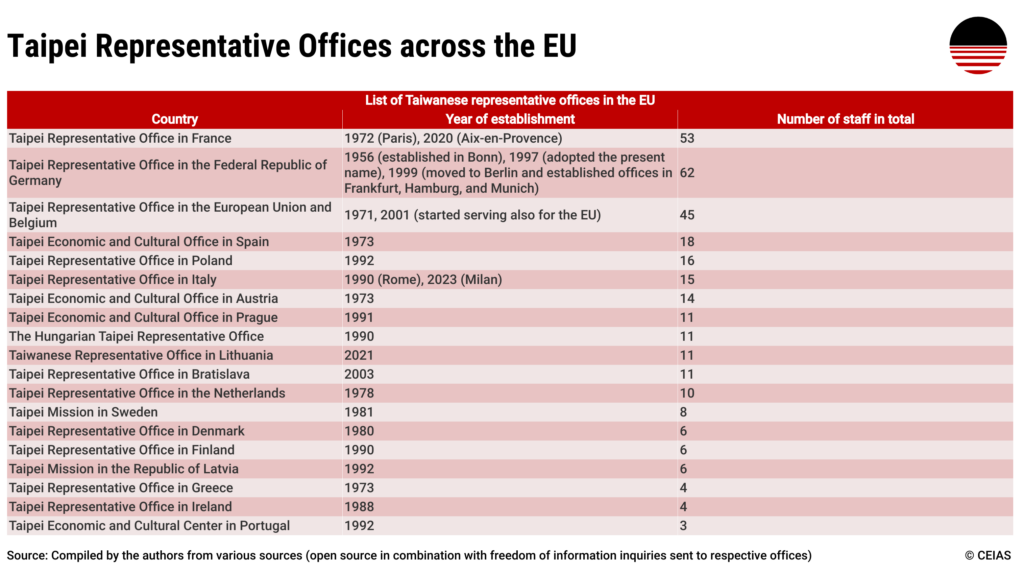
Figure 3
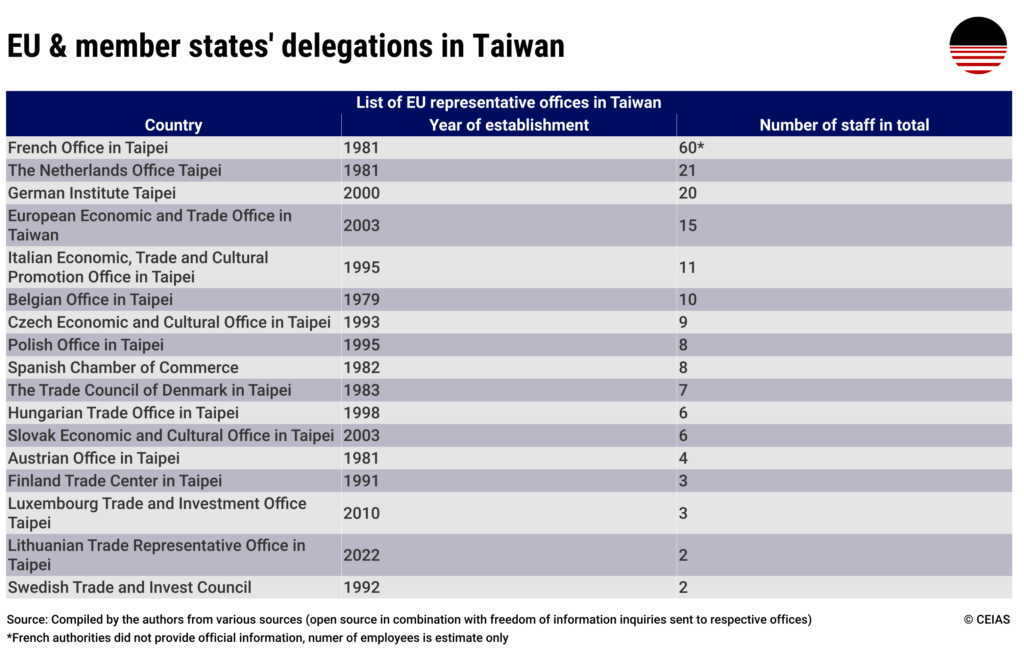
Figure 5
As seen above, the largest number of employees are located in Taiwanese offices in Western Europe and their offices in Taiwan. However, when it comes to interactions, the CEE countries (1), while not boasting a large number of staff, are in the lead, making up more than 50% of the EU-wide political engagements with Taiwan between 2019 and 2023, especially the Czech Republic, Lithuania, Poland, and Slovakia. The other countries are catching up quickly, namely Finland, Italy, Ireland, and Portugal.
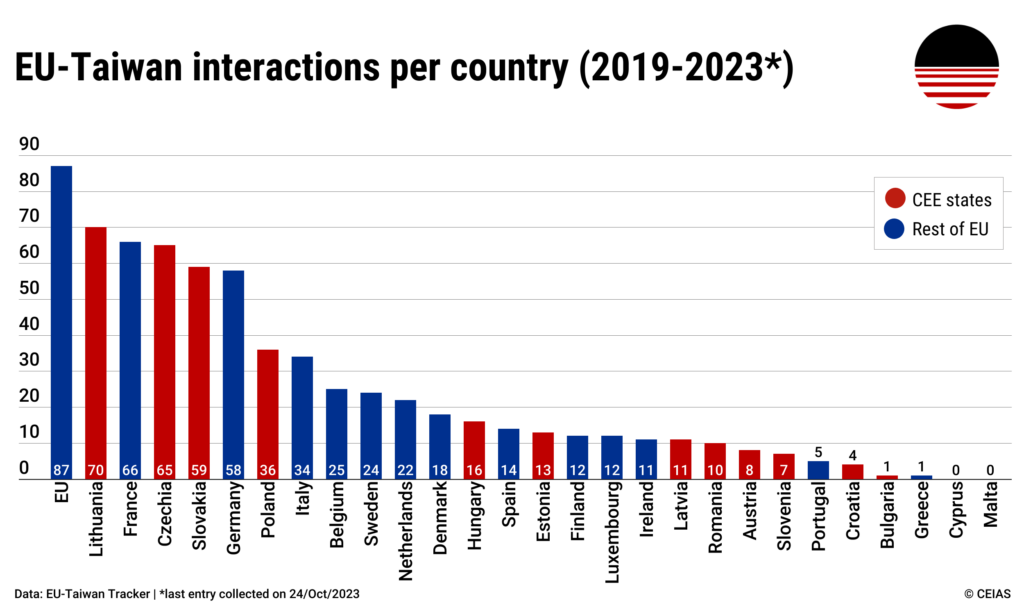
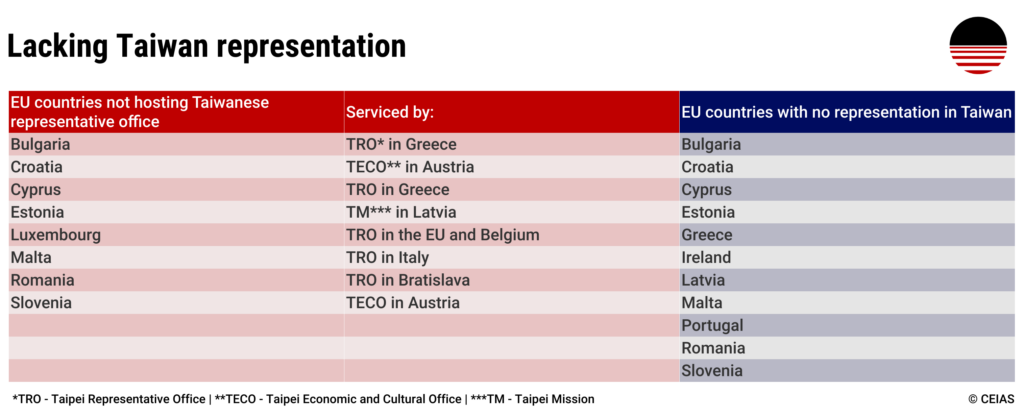
The size of the office, in terms of staff number, is not the most decisive factor in strengthening bilateral relations with Taiwan. It seems more important whether a country has actually set up a representative office. For the countries which have not established bilateral offices with Taiwan – Bulgaria, Croatia, Cyprus, Greece, Malta, and Slovenia (see Figure 6) – interactions are very few or even zero. In terms of expanding and deepening EU-Taiwan ties, it is, therefore, highly recommended to continue the facilitation of these quasi-diplomatic interactions. A positive development can be seen in Estonia’s plans to establish such reciprocal representation in the near future.
(1) 12 CEE countries include Austria, Bulgaria, Croatia, Czechia, Estonia, Hungary, Latvia, Lithuania, Poland, Romania, Slovakia, and Slovenia
This work has received funding from the European Union’s Horizon Europe coordination and support action 101079069 — EUVIP — HORIZON-WIDERA-2021-ACCESS-03.
Funded by the European Union. Views and opinions expressed are however those of the author(s) only and do not necessarily reflect those of the European Union or the European Research Executive Agency (REA) . Neither the European Union nor the granting authority can be held responsible for them.

